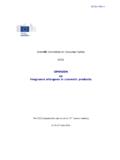Transcription of The value of outdoor learning: evidence from …
1 SchoolScienceReview,March 2006,87(320)107 Dillonetal. The valueofoutdoor learningThe valueofoutdoor learning :evidencefromresearchin theUKandelsewhereJustinDillon,MarkRickin son,Kelly Teamey,MarianMorris,MeeYoungChoi,DawnSan ders and Pauline BenefieldResearch indicates that fieldwork, properly conceived, adequately planned, well taught and effectively followed up, offers learners opportunities to develop their knowledge and skills in ways that add value to their everyday experiences in the classroomABSTRACTThis article summarises the key findings of a review of the research into outdoor learning published between 1993 and 2003. It summarises what is known about the impacts of fieldwork and then discusses what is known about effective practice before concluding with a look at barriers to article summarises thekeyfindings ofa reviewthat criticallyexamined150 pieces of researchonoutdoor learning publishedbetween1993and2003(Rickinsonet al.)
2 ,2004). TheFieldStudies Counciland partner organisations commissioned the reviewin response to thegrowingconcern that opportunities for outdoor learningby school students inEnglandhavedecreased substantiallyin recent years (Harris,1999; Barker,SlingsbyandTilling,2002).Wefound substantialevidence toindicate that fieldwork, properlyconceived,adequately planned,well taught andeffectivelyfollowedup,offers learners opportunities todevelop their knowledgeand skills inways that addvalue to their everydayexperiences in the classroom. In this articlewe distilsomeof the review s findings of particular relevanceto secondary school teachers. Welookfirst at theimpacts of fieldworkandoutdoor educationalvisits,and thendiscuss what is knownabout effectivepracticebeforeconcludingwithalo okat barriers offieldworkandoutdoor educational visitsNot surprisingly, research suggests that students remember fieldworkandoutdoor visits for manyyears.
3 DierkingandFalk (1997) found that 96 per cent ofagroup (128childrenandadults) could recallfield trips takenduring their earlyyears at school. However, simply recallingavisit does not meanthat it was aneffectivelearningexperienceor that the timecouldnot bemoreusefully spent in the relativeefficacyof fieldworkcomes froma s tudyof secondary students from11 Californian schools that usedanenvironmentallyfocusedcurriculum. The students scoredhigher in72 per cent of theacademicassessments (reading,science,maths,attendance rates andgrade point averages) than students from traditional schools (SEER,2000). Eaton (2000) found that outdoor learningexperiences weremoreeffectivefor developingcognitive skills thanclassroom-basedlearning. Suchcomparative studies, thoughimportant,are rareandverydifficult terms of theimpact on s tudents attitudes,Mittelstaedt,Sanker andVanderveer (1999) lookedat theimpact ofaweek-longexperiential programmeon46 USchildren.
4 The children (31 male,15 female) attendedafive-day summer-school programmeofbiodiversityactivities. Theauthors found that even though the childrenarrivedwitha positive108 SchoolScienceReview,March 2006,87(320)The valueofoutdoor toward theenvironment, theyleft withaneven stronger positiveattitude (p. 147). Uzzellandcolleagues,however, soundanoteofcautionabout making too manyassumptions about the relativepermanencyofattitudinalchanges (Uzzell,RutlandandWhistance,1995). The researchers point out that environmentalattitudes arefairlywellentrenched: What theylearn .. bothin the classroomandinthefield,only serves to strengthen their views andperhaps heighten their senseofaction paralysis (p. 177).In terms ofchanging students behaviours,Bogner (1998) testedone-dayandfive-dayversions ofalong-establishedoutdoor ecological programmewith 700 s tudents aged11 13inaGermannationalpark.
5 Bogner reported that the5-day programexplicitly provokedfavorable shifts inindividualbehavior,bothactualandintend ed (p. 17).What counts as effective practice?Thereis considerable evidenceindicating that longer programmes aremoreeffective than shorter ones. AstudybyEmmons (1997) ofan outdoor environmentaleducation programmeinBelizeargued that:thelengthof time that students spent at Cockscomb (fivedays for most) appearedtobeimportant in the reductionofnegativeperceptions of theenvironment,includingfears .. A shorter environmentaleducationprogrammemaynot havehad the sameeffect.(p. 342)Bogner s (1998) evaluation,mentionedabove,foundthat only the residentialfive-day programmehadanyeffect onbehaviourallevels (p. 26).Thevalueof p reparatorywork prior to outdoor learningis another factor well-evidencedin theliterature.
6 For example,in their studyofnature-basedexcursions inQueensland,BallantyneandPacker (2002) found significant differences between students whohaddone pre-visit activities and thosewhohadnot. Theformer bothlookedforward to,andenjoyed, their visit more than thelatter. WorkbyOrionandHofstein (1994) inIsraelprovides a s trong rationalefor preparatoryworkthat introduces students to the cognitive (field trip concepts and skills),geographic (field trip setting),and psychological (field trip processes) aspects offieldwork. Thebenefit of p reparatorymeetings,discussions,explanati ons andmaterials for creatingaccessibleandinclusivefieldcours es is stressedbyHealeyet al. (2001).Several studies highlight theimportanceofcarefullydesignedlearning activities andassessment of s tudents outdoor learning .
7 BallantyneandPacker (2002:228) warnagainst over-structuringlearningactivities. Theyfound that theuseofworksheets,note-takingand reports wereallunpopular withstudents,anddidnot appear tocontributegreatlyto[their]environmenta llearning . They suggest that touchingandinteractingwithwildlifeis amoreeffective strategy. Emmons (1997) studyofafive-dayfieldcourseinBelizefound that students learningwas facilitatedby their sharedanddirect experienceof the surroundings,as wellas their teachers role-modellingof their interests andlikes about theforest tochoosebetweendifferent kinds oflearningactivityappears tobeanimportant requirement for students. OpenshawandWhittle(1993) comment upon theneedfor teachers andoutdoor educators tobalance the students desirefor a structurewithinwhich theycanfeelcomfortableandnot threatenedand theaddedexcitement causedby theunexpected (pp.)
8 63 64).Theneedfor effectivefollow-up workafter outdoor experiences is stressedby severalauthors (for example,OrionandHofstein,1994). Uzzellet al.(1995) emphasise theneedfor clear links tobemadebetweenoutdoor activities ( theworldofour physical surroundings ) andindoor activities ( theworldof the school ).Factors influencingoutdoor learningandits provisionSofar wehavelookedat theimpacts of fieldworkandat what constitutes effective practice. It is the case,though, that thereis substantialvariationbetweenstudents and schools in terms ofopportunities toexperience theoutdoors andin the subsequent learning that takes place. Sowhat are thefactors that affect howmuchlearning takes placeoutdoors andtheamount and qualityof p rovisionofexperiences for students?
9 Notablebarriers include:lfear andconcernabout healthand safety; lteachers lackofconfidencein teachingoutdoors;lschoolcurriculum requirements;lshortages of time, resources and support;lwider changes withinandbeyond the wellas theseexternalfactors,a rangeof personalinfluences onlearninghavebeenidentifiedas ,March 2006,87(320)109 Dillonetal. The valueofoutdoor learningAgeAnAustralian studyof school students perceptions oflearningin naturalenvironments found significant differences between the p rimaryand secondary schoolagegroup (BallantyneandPacker,2002). Primaryschool students werefound tobe significantlymoreenthusiastic than their secondarycounterparts,bothbeforeandafter the experience. The twogroups werealsolooking forward todifferent aspects of theexperience:Primary school students tended tofocus onspecificfeatures of the programme.
10 Secondaryschool students gaveamorevaried rangeofresponses,includinggettingout of school,experiencingnature .. and experiencingsomethingnewor different. (p. 221)Prior knowledgeandexperienceStudents learningcanbe s tronglyinfluencedbytheir previous fieldand classroom-basedexperiences (OrionandHofstein,1994; Lai,1999). OpenshawandWhittlenote that if students havebeenaccustomedtoadiet of experiments basedonwell tried recipes that work , then realexperimental practicalecologyis likely to proveadifficult experiencefor them (1993: 64).Fears and phobiasSeveral studies suggest that outdoor settings canbe the sourceofgenuinefear andconcernfor young people. Simmons (1994a,b) foundchildreninChicagoexpressed concerns about avarietyofnature scenes: possiblenaturalhazards; threats fromother people; andinconveniences for their physicalcomfort.




